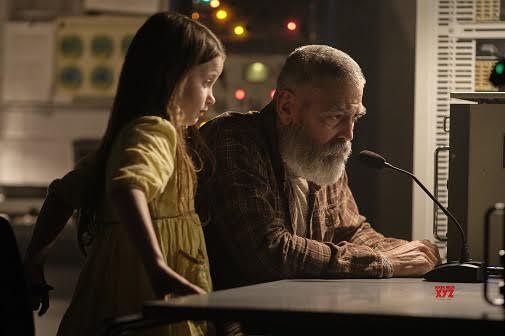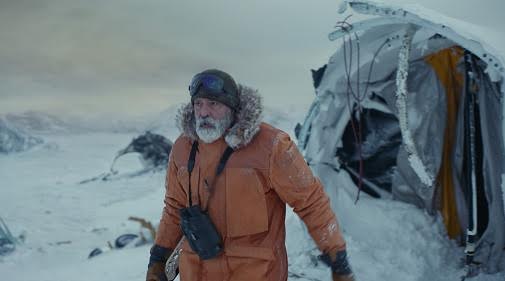 by Tony Ruggio
by Tony Ruggio
The Midnight Sky is a mild return to form for director George Cloonney. It’s simultaneously a greatest-hits album of science fiction filmmaking of the last ten years and a beautiful, melancholic story about regret. In the midst of a global pandemic, with more proof arriving every year of what danger might await us in our planet’s future (or even right now), we’re all more aware than ever of what terrible things are possible in this world. Somehow, decades of apocalyptic cinema did not prepare us.
Clooney is Augustine Lofthouse, a scientist who has spent his life finding habitable planets at the expense of his personal life, pushing away those closest to him to devote his life to saving our future...
In 2049, when a vague cataclysmic event (we never learn the exact details) destroys much of Earth and humanity via radiation, an old and ill Augustine holes up in a base in the Arctic, desperately trying to contact one of the ships exploring our heavens for another home.
The Midnight Sky has myriad problems, not the least of which is a wobbly structure, favoring Clooney’s tired, lonesome man of regret early on and favoring the voyage of the spaceship Aether later on. Housed in its chambers, a number of astronauts and scientists (Felicity Jones, David Oyelewo, Demian Bichir, Kyle Chandler, Tiffany Boone) struggle to navigate their way back to Earth, this event unbeknownst to them, and their ship flailing in the dark with radar and communications compromised. These two halves make for compelling if familiar cinema on their own, particularly Augustine’s perilous trek from one base camp to another with an abandoned child named Iris (Caoilinn Springall) at his side. Together, with much of Clooney’s time spent in the first hour and much of the Aether unfolding in the second hour, they come off as somewhat disparate tales. Despite obvious tie-ins, the connective tissue between them remains tenuous until an implausible third-act turn that means to deliver one of those “aha” moments yet never truly coalesces.

These twin tales of survival nevertheless work quite well individually. This might be the first time Clooney is portraying an “old man” and everything that can entail. His Augustine is a scraggly shell of his former self, sporting a scruffy beard and lumbering about his Arctic base between coughs and bouts of dialysis. His failing health is only matched by his perseverance. He’s refused to evacuate so that he may have a chance of informing someone above of Earth’s uninhabitable state. At the end of the world, he is a man of contrition, forever regretting that some years ago he gave up a wife and a daughter, an entire family, in chase of a scientific pursuit he has seemingly failed to reach. Augustine is slowly giving up hope, and were it not for the silent Iris who was left behind, he would have even less to keep him going.
Clooney manages to convey that longing and that ebbing glint of what used to be without overstating it. His is a finely understated performance, one nicely complemented by a quietly luminous young actress in Springall. While their growing bond could’ve used a bit more sprucing, one seemingly truncated in service of the almighty Netflix algorithm, we can’t help but fret over their separation in the middle of a blizzard and other hazards. The blizzard, punctuated by the threat of a pack of wolves and excellent, opaque cinematography, is a harrowing sequence that stands up there with some of the finer moments in pictures like The Martian, and reminds one of them as well.
Sometimes that means borrowing liberally, sometimes that means simply paying homage, or perhaps it’s the inevitable result of so much science fiction produced in the span of a single decade. There are bound to be ideas, themes, even narrative events shared in the pursuit of prophetic storytelling. When the Aether finds itself in the crosshairs of a meteor shower, astronauts holding on for dear life, one can’t help but recall Gravity’s opening roller-coaster of debris. When pregnant Sully (Jones) considers her future whilst floating in space, Sandra Bullock’s steely heroine immediately comes to mind. It wouldn’t be a surprise to learn Clooney had Gravity on the mind given his own involvement with the 2013 blockbuster.
Regardless of such familiarity, Sky has a pulse unto its own. Iris and Augustine’s entire journey across miles of tundra and glacier is an elegiac nail-biter, from the foreboding of a downed airplane to the gorgeous images of our North Pole at twilight. Whether it was CGI or the real deal Iceland, Clooney has an eye for the terrifying beauty of Arctic landscapes. These images ought to grant The Midnight Sky a nomination in Best Visual Effects, if nothing else.

I could emphasize Clooney’s few directorial mistakes, a Desplat score that doesn’t move or a dubbed performance that proves incredibly distracting, but even after so many cinematic space adventures or apocalyptic dramas this century already, it’s difficult not to be swept up now in a story about humanity grappling with its own mortality. It’s also difficult to nitpick a film with its heart so firmly in the right place. I have often lamented the film media’s strange aversion to movies about climate change. I have found it deeply regrettable that, as a community, we have mostly forgotten an indie gem like Take Shelter, or cast aside a worthwhile experiment like Mother! Despite our political allegiances, perhaps we are not so immune to the human tendency to underestimate our own mortality, to consider unimportant these artful warnings of impending doom. Given the state of the country and our response to COVID, it’s no wonder at all. B
Available to stream on Netflix